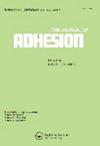用于粘合剂高通量测试的对接剪切接头(BSJ)试样
IF 2.3
4区 材料科学
Q2 ENGINEERING, CHEMICAL
引用次数: 1
摘要
机器学习被广泛应用于材料研究和开发,包括粘附技术。然而,它需要一个大的数据集来训练模型,以优化、开发和设计新的粘合剂。本研究提出了一种新型试验机,可以快速、高通量地测量粘接接头的抗剪强度。将小圆柱形对接剪切接头(BSJ)试样置于托架中,由金属试样推挤器推动直至破坏;在此过程中,力和位移被记录下来。该试验机可用于快速进行测量,只需将样品放在支架中并推动即可。将该方法测得的平均抗剪强度与单搭剪试验测得的平均抗剪强度进行比较,并结合有限元模拟应力分析表明,该方法可以更准确地测量抗剪强度,在胶粘剂层中可以获得更高的纯剪切水平,应力集中程度较低,胶粘剂末端剥离应力较小。这表明,使用所提出的测试方法可以快速测量胶粘剂粘合接头的抗剪强度,从而促进了利用机器学习开发新型胶粘剂。本文章由计算机程序翻译,如有差异,请以英文原文为准。
A butt shear joint (BSJ) specimen for high throughput testing of adhesive bonds
ABSTRACT Machine learning is extensively used in material research and development, including adhesion technology. However, it requires a large dataset to train the models for optimizing, developing, and designing new adhesives. This study proposes a novel testing machine that enables quick high-throughput measurements of the shear strength of adhesively bonded joints. A small cylindrical butt shear joint (BSJ) specimen placed in a holder was pushed by a metal specimen pusher until failure; during this process, the force and displacement were recorded. This testing machine can be used to quickly conduct the measurement by simply placing the specimen in a holder and pushing it. A comparison of the average shear strength measured by this method and that measured by single-lap shear tests, coupled with stress analysis using finite element simulation suggested that the proposed method can measure the shear strength more accurately, where a higher level of pure shear can be achieved in the adhesive layers with a lower degree of stress concentration and smaller peeling stress at the extremities of the adhesives. This indicates that the shear strength of adhesively bonded joints can be measured quickly using the proposed testing method, thereby facilitating the development of new adhesives using machine learning.
求助全文
通过发布文献求助,成功后即可免费获取论文全文。
去求助
来源期刊

Journal of Adhesion
工程技术-材料科学:综合
CiteScore
5.30
自引率
9.10%
发文量
55
审稿时长
1 months
期刊介绍:
The Journal of Adhesion is dedicated to perpetuating understanding of the phenomenon of adhesion and its practical applications. The art of adhesion is maturing into a science that requires a broad, coordinated interdisciplinary effort to help illuminate its complex nature and numerous manifestations.
 求助内容:
求助内容: 应助结果提醒方式:
应助结果提醒方式:


